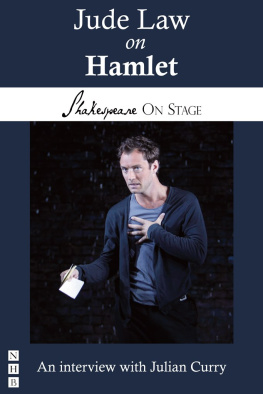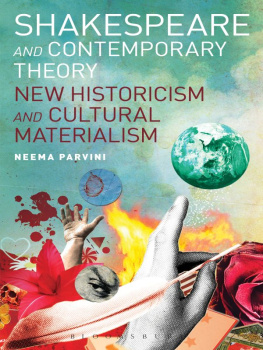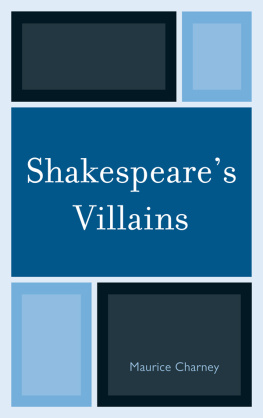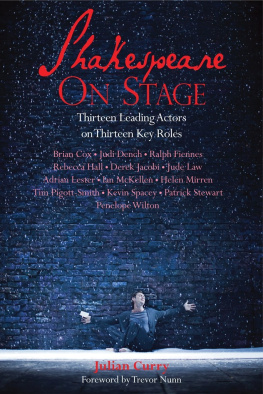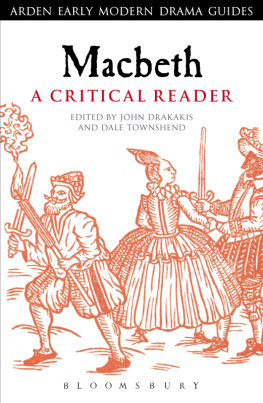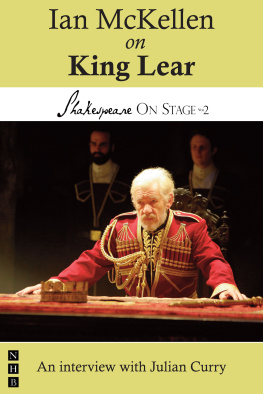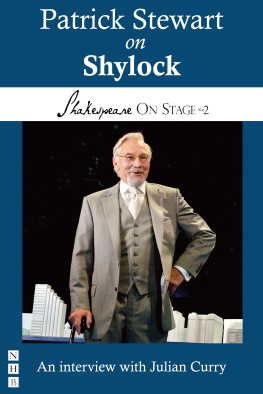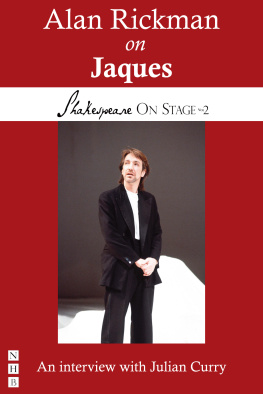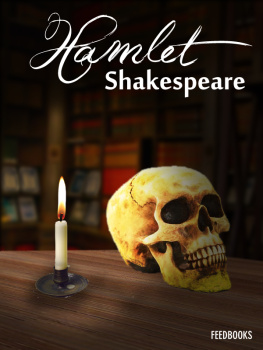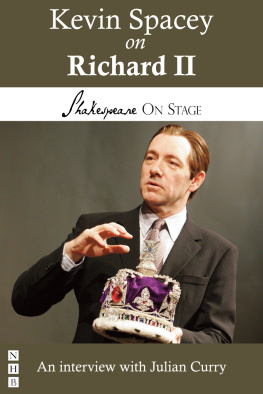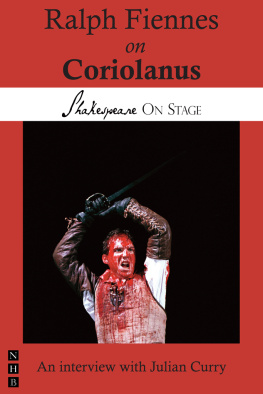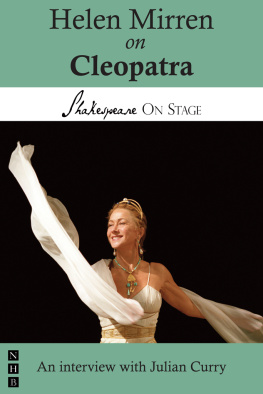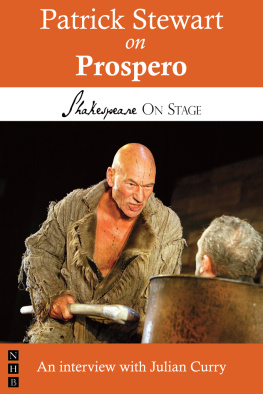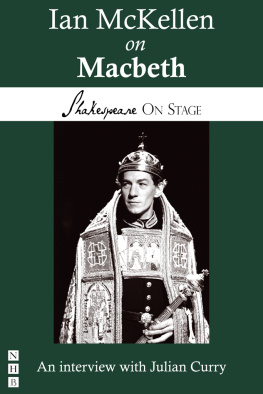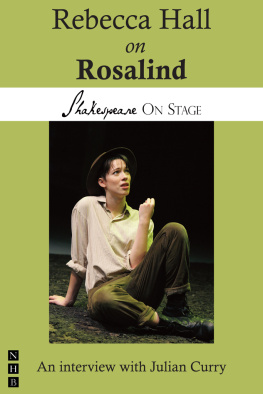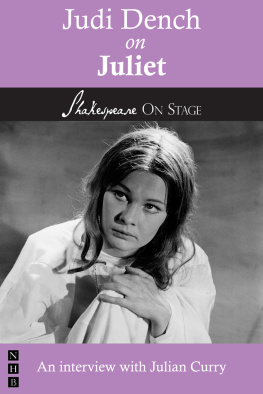Jude Law
on
Hamlet
Taken from
SHAKESPEARE ON STAGE
Thirteen Leading Actors on Thirteen Key Roles
by Julian Curry

NICK HERN BOOKS
London
www.nickhernbooks.co.uk
Jude Law
on
Hamlet
Hamlet (160001)
Donmar Warehouse in the West End
Opened at the Wyndhams Theatre,
London, on 3 June 2009
Directed by Michael Grandage
Designed by Christopher Oram
With Ron Cook as Polonius, Peter Eyre as the Player
King and the Ghost, Gugu Mbatha-Raw as Ophelia,
Kevin R. McNally as Claudius, Alex Waldmann as
Laertes, and Penelope Wilton as Gertrude
H amlet may or may not be the greatest play ever written, but it is certainly one of the most written about. It has been analysed, interpreted and argued over from countless perspectives. The old Arden edition had 152 pages of Longer Notes, devoted to the detailed examination of tricky passages of text. By contrast, Antony and Cleopatra had just three such pages.
Hamlet is Shakespeares longest play. It is a jewel in the late Elizabethan crown. Hamlet is a man whose theatrical antecedents stretch back to the Middle Ages, yet whose thoughts echo timelessly through world culture. The play is a masterpiece: a thrilling drama of revenge, politics and inner turmoil, that has never been off the stage since it was written. In the past four hundred years Hamlet has been played by the leading actors, male and occasionally female, of each successive epoch. He is the most intriguing, yet ultimately unfathomable, of Shakespeares creations. One can never know everything about him. As the critic Hazlitt commented: It is we who are Hamlet. A university student, Hamlet is philosophical and contemplative. He is plagued with questions that cannot be answered with any certainty. It is through the plays five towering soliloquies that the audience gets closest to understanding the workings of Hamlets mind and imagination. He is thoughtful to the point of obsession, yet on occasion he can behave rashly and with surprising rapidity, as when he impulsively kills the hidden Polonius.
The play investigates madness, both real and feigned. Hamlet appears effortlessly to assume the role of a madman, with erratic behaviour, wild speech and sudden sharp innuendo. Yet the audience is often left uncertain as to whether they are watching the genuine article or an accomplished fake. His mood ranges from overwhelming grief to seething rage, as the playwright explores themes of treachery, revenge, love, lust, incest and moral corruption. Shakespeare endows Hamlet with brilliant verbal dexterity. His words may mean several things at once, indicating his fragmented thoughts and disturbed emotions.
His melancholy and discontent are frequently counterpointed with wit, which is facilitated by chunks of the play being in prose, as for instance when he needles Polonius after the play-within-the-play [3.2]:
Do you see yonder cloud thats almost in shape of a camel?
By thmass and tis like a camel indeed.
Methinks it is like a weasel.
It is backed like a weasel.
Or like a whale?
Very like a whale.
Though not always funny, such repartee could only come from the lips of a person with a heightened sense of the absurd. His banter is often defensive/aggressive, as of a man on guard against real or imagined enemies. For all Hamlets profundities, a nimble wit is never far below the surface. He repeatedly sees comedy in the bleakness of his situation. What news? he asks Rosencrantz. None, my lord, but that the worlds grown honest, joshes his fellow student. To which Hamlet replies Then is doomsday near [2.2]. It is a response worthy of Samuel Beckett.
There are Hamlets for every generation, often made memorable by a special quirk. David Warner wore an endless scarf, Mark Rylance was in pyjamas, and Jonathan Pryce startlingly ventriloquised the Ghost and spewed it up from his own entrails. When Ian McKellen played Hamlet in the West End, Mander and Mitchenson, a legendary pair of first-nighters, came backstage. Congratulations! You are our twenty-eighth Hamlet! Twenty-eighth? said Ian. How on earth do you remember them all? Well, theres always something special, something that marks a performance out from the rest. For instance, John Neville, well never forget, had a tiny hole in his tights pointing to the crotch right there! I treasure this story, not only because it makes me laugh. It puts what we do into perspective. Imagine being cast as Hamlet, the great part, the pinnacle of an actors ambition. You excitedly tell friends and relatives. You research and prepare, eager to put your own stamp on the part. You rehearse. The first night arrives. Your dressing room oozes with flowers and good-luck messages. At the post-show party champagne flows, youre embraced and told you were excellent. Next morning you run out to buy the papers and find your performance praised. Youre over the moon. But wind the clock forward ten years, and what is your Hamlet remembered for? A tiny hole in the crotch of your tights.
Id worked with Jude Law on the film Sky Captain and the World of Tomorrow, a movie shot entirely against blue screen, with everything except the actors computer-generated, and put in afterwards. This involved unusual challenges. I remember, for instance, the astonishing spectacle of Jude fighting a robot that wasnt there yet. We met again in his dressing room during the run of Hamlet at the Wyndhams Theatre in 2009. In spite of doing eight shows a week, he was relaxed and seemed as fresh as a daisy. Of all the contributors to this book, he was one of the most genuinely thoughtful and spontaneous. My only regret was that our time was limited to an hour, which meant that I wasnt able to cover all the questions I had intended to ask. However, if one hour isnt long enough to do justice to a discussion of Hamlet, you could well say the same of ten hours.
Julian Curry: This is the first time youve played Hamlet. And your first Shakespeare as well. You dived straight in the deep end.
Jude Law: I guess I did.
You said during rehearsals that you were terrified. Are you enjoying it now?
Did I?
You said that to Charles Spencer when he came and interviewed you for the Telegraph.
I dont know, its funny. When a theatre critic is in front of you asking how you feel, I suppose the terror comes simply from the side of the job which is offering it up to other people for their opinion, especially theatre critics. But the process of the work was phenomenal, so my overriding memory of that period of time was one of great joy. I loved the rehearsal process. Im in an amazing cast, being led by a wonderful director who works with a very collaborative and incredibly efficient team. As you well know, you dont get a much better scenario than that. I think the terror, as I said, is when you realise youll have to give it to the outside world, and all this joy and discovery could well be thrown back in your face. Fortunately weve been well received, and embraced somewhat by the theatre community. So now on the other side of the fence, having opened, I can finally relax and get on with the job at hand.
I thought there was a dynamism to the production, obviously coming largely from you, which was gold dust. Hamlet is so familiar that its easy to think Yes yes, alright, Ive heard this bit before. Come on, get a move on! But I never had that feeling with this production.
Next page
